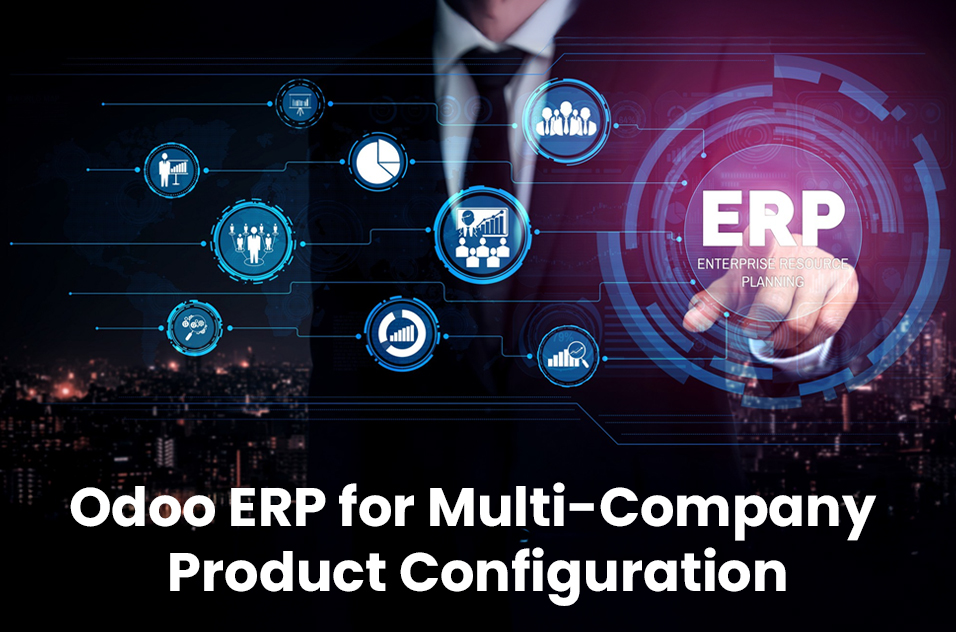
Odoo Multi-Company Product Configuration allows businesses to manage products, pricing, and stock across multiple entities within a single Odoo ERP system. This feature ensures seamless collaboration, centralized data, and reduced redundancy, making it easier for organizations with different subsidiaries or branches to stay aligned.
In today’s competitive business environment, managing multiple companies efficiently is no longer optional; it’s a necessity. From ensuring data accuracy to streamlining inter-company transactions, Odoo ERP offers robust multi-company capabilities that legacy systems simply cannot match. Let’s look into how businesses can leverage Odoo ERP to optimize product management across different entities.
Odoo Multi-Company Product Configuration is a feature in the Odoo ERP software that allows organizations with multiple entities to manage products centrally while supporting each company’s unique requirements.
It ensures:
In simple terms, it unifies product operations for multi-entity businesses under one ERP umbrella.
It is important because it eliminates duplication, reduces errors, and streamlines cross-company transactions. Businesses gain:
Without this feature, businesses often struggle with mismatched data, manual updates, and fragmented customer experiences.
Odoo’s multi-company framework works by linking products, partners, and warehouses under one ERP ecosystem. Here’s how:
This ensures both centralized visibility and localized flexibility.
Odoo ERP is not just about managing products; it’s also about enabling smoother collaboration between subsidiaries.
By simplifying collaboration, Odoo empowers businesses to function as a unified group instead of isolated entities.
Businesses enjoy several advantages:
These benefits make Odoo ERP stand out compared to legacy systems, which often lack multi-company flexibility.
Unlike legacy systems, which require separate setups or manual integration, Odoo ERP software development provides built-in support for multi-company operations.
This makes Odoo ERP vs. legacy systems a clear win for growing businesses that need scalability and agility.
To configure Odoo Multi-Company Product Configuration:
This structured process ensures smooth product handling across entities.
Without Odoo ERP’s multi-company features, businesses often encounter:
Odoo ERP resolves these pain points by centralizing management and automating repetitive tasks.
Choosing the right implementation partner is critical. Look for:
A reliable partner ensures smooth setup, tailored customization, and long-term ROI.
Odoo Multi-Company Product Configuration is a game-changer for businesses with multiple entities. It brings consistency, accuracy, and efficiency by centralizing product data, streamlining processes, and automating inter-company workflows.
At Zoondia, we specialize in delivering tailored Odoo ERP solutions, helping businesses move beyond outdated systems and embrace scalable, future-ready ERP architecture. Whether you’re setting up new subsidiaries or optimizing existing ones, our experts ensure you get maximum value from your ERP investment.
Ready to streamline your multi-company product management?
Connect with Zoondia and transform your Odoo ERP system to the next level.
Is Odoo ERP better than legacy systems for multi-company management?
Yes. Odoo offers flexibility, automation, and scalability, while legacy systems are rigid and fragmented.
Can Odoo multi-company work for e-commerce and online sales?
Yes. Odoo supports multi-company eCommerce, so different companies can run their own online stores while still managing products centrally.
Do I need technical knowledge to configure multi-company products in Odoo?
Not necessarily. With the right Odoo ERP partner, setup and training can be simplified for your team.
How secure is data sharing between companies in Odoo ERP?
Odoo provides robust role-based access control to ensure only authorized users can access cross-company data.
Does Zoondia offer Odoo multi-company setup?
Yes. Zoondia provides expert Odoo ERP implementation, customization, and support for multi-company management.
By continuing to use the website, you agree to our Cookie Policy. To learn more about how we process your personal data, read our Privacy Policy
